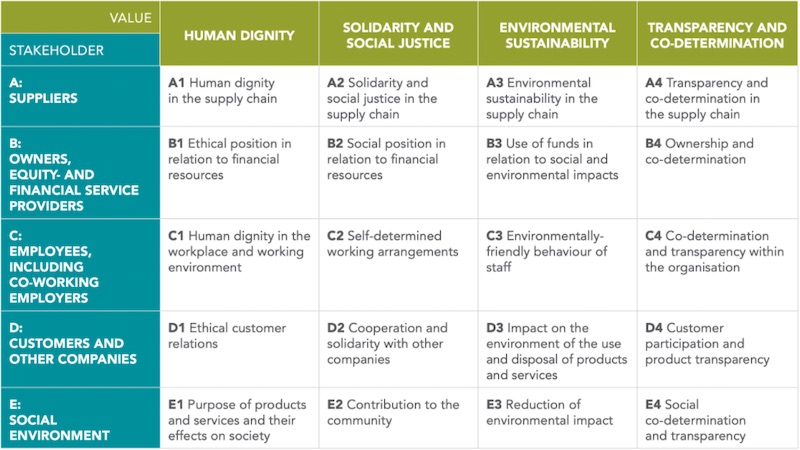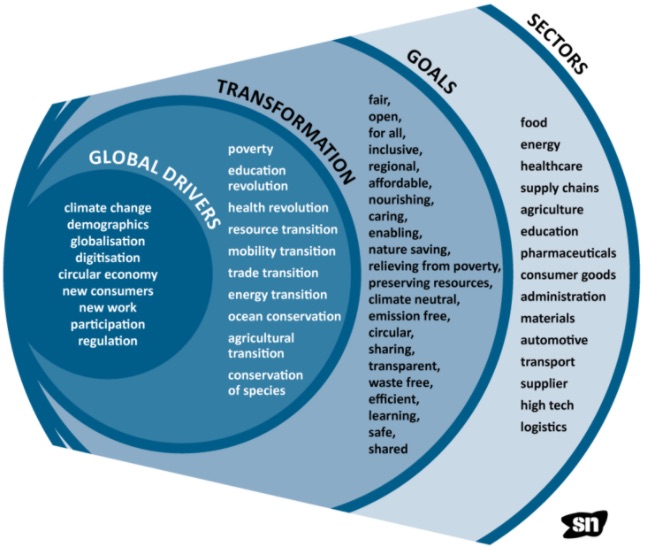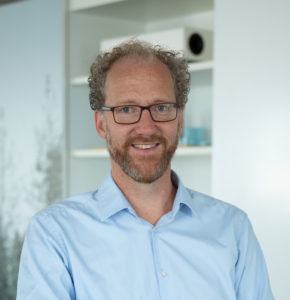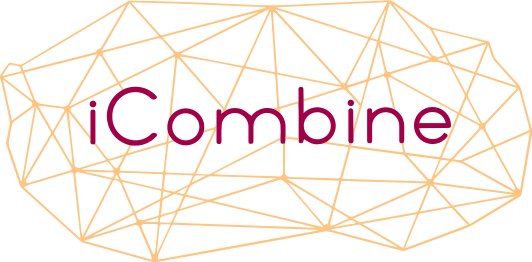This article has originally been published here (German).
People need a sense. If their own work is meaningful, then employees are all the more motivated. This is a central idea of New Work. Hence, we repeatedly emphasize the importance of a company’s purpose in our New Work bubble. All decisions should be based on this purpose. In a complex world, the purpose is the fixed star that shows the way and unites people.
Attention! A sexy purpose, invented by marketing professionals or cobbled together in a quiet little room, is not very authentic. If the company is seemingly and primarily dedicated to profit maximization and stakeholder value, the sexy purpose on the wall looks like a farce.
So how can I actually realize a good purpose? What formal possibilities and legal constructs are there to credibly align the organization with its purpose? How do pioneering organizations try to explicitly focus on and protect their purpose? What role can the economy for common good, cooperatives, B-corps, associations & the ownership of responsibility play here?
These questions were explored in the New Work Berlin meetup on September 22, 2020. Here we summarize the highlights of the entrepreneurs, who shared their experiences and thoughts on the topic. Read on to learn how they anchored a purpose within their organizations and processes, as well as their challenges and continuous improvements.
Inspiration 1 – Dive into the Purpose Economy
As a business psychologist, Achim Hensen has long been interested in how people work together. He saw a lot of potential, but it wasn’t really leveraged in the usual forms of business. While dealing with the topic of New Work, Achim implemented principles such as self-organization, feedback culture and much more in a small company. This was a great experience until suddenly a large corporation bought this company. This felt completely wrong for him, as the good initial ideas quickly disappeared.
Paradigm Shift to Responsible Ownership
Thereupon he began to study the ownership of companies. To whom do companies actually belong? There were some good examples of companies that did things differently than the rest. He discovered two central principles:
- Self-determination: the majority of the voting rights are held in the company.
- Sense orientation: profits are mostly reinvested or donated.
These two principles are embedded in the corporate DNA. The company belongs to itself and in trust to those who currently take responsibility for the mission. This is called steward-ownership. It represents a paradigm shift. Responsible ownership breaks with two very strong principles:
Either I’m lucky to be born into the right family, or I have a lot of money and buy a company.
So the change is that property and power are no longer inherited within a family or can be bought with a lot of money. Ownership of responsibility is based on skills and values.
Achim reports on studies showing that companies set up in this way have a longer probability of survival. They retain employees and managers longer, pay better salaries and even achieve higher medium-term profitability. But why then are so few companies working with responsible ownership?
Achim gives three reasons:
- Knowledge: Too little is known to the general public about what other forms of organization can look like.
- Solutions: The implementation is still quite difficult. Companies had to work on it for a long time to set up everything legally.
- Financials: This idea of entrepreneurship and ownership is not yet sufficiently supported for investment and growth.
New Work needs new Ownership
purpose-economy.org informs and accompanies businesses on their way to responsible ownership as an official legal form. In doing so, it networks companies that are characterized by responsible ownership structures and makes them visible to interested parties. In addition, their Purpose Foundation becomes a veto capable part, e.g. in a controlling body, so that the new constitution cannot be changed at first occasion. Sense and self-determination are two central principles of the New Work movement. Achim’s proposal is to support these two principles by adding self-responsibility as a third. Corporate ownership must be rethought if meaning and self-determination are to be realized in a truly sustainable way.
Inspiration 2 – the Economy for the Common Good
A good life for everyone! This is the goal of ecogood.org. In order to achieve this goal, our current system must change radically on an economic, political and social level. The idea for this was born in Austria in 2010. In the meantime, the civil movement is organized in regional groups and associations across large parts of Europe, the USA, Latin America and Africa. The core of the concept is a common good matrix, which organizations, cities and even entire states can be audited for. The result is an attestation of the extent to which the economic performance of an organization serves the common good.
Applying the Common Good Matrix

In the assessment process, the organization positions itself on a scale depending on how developed each value is.
Working with the matrix is a large step for many organizations. You start dealing with your own processes, identify improvement potential and question aspects that have been taken for granted so far. A self-assessment based on the matrix, the subsequent comparison and feedback from peer group organizations help to determine the company’s own direction. In this process, the purpose is critically reviewed. Sometimes, these steps even help to re-invent the purpose. Philipp Wodara is a local board member of the common good economy. He recommends a revision of the matrix every two years.
Look at the Big Picture
On the political level the European Economic and Social Committee has already recognized the economy of the common good. Here, the goal is to anchor its model on a long-term basis in laws and constitutions. Such new laws could for example provide tax incentives for more sustainability in the economy. To promote the movement, regional groups organize lectures, workshops and congresses on the educational level. For the initiators, a participatory, democratic and result open process is important in order to create a more sustainable economy.
Inspiration 3 – A Social Beer Business
Quartiermeister openly displays its common welfare economics certificate. The beer brand from Berlin-Kreuzberg is positioned as a social business operating throughout Germany. David Griedelbach, one of the founders, says that beer in itself is a social product:
People come together and drink beer in a convivial, social setting. That alone is a corporate purpose.
But Quartiermeister goes far beyond that. Founded in 2010, Quartiermeister works according to self-defined principles. Following the motto Drink – Accompany – Change the beer brand supports social projects with 10 Eurocents per sold liter. As a result, around 200,000 Euros have already been invested in small, local projects throughout Germany in recent years. Profits are therefore distributed where the product is produced.
This social orientation clearly distinguishes Quartiermeister from the few giant global corporations that dominate almost the entire beer market. To ensure independence from global corporations, Quartiermeister has also worked with Purpose Ventures. Additionally, Quartiermeister attaches great importance to transparency. They regularly publish their figures, profits and activities. The organizational form of Quartiermeister is still quite classical. But currently, they are investigating how a modern form of organization can work in the fast-moving consumer goods industry. It is emphasized by the employees. A further impulse for this was the common goods economy matrix. Its preparation has provided many relevant impulses for more sustainability.
Inspiration 4 – A new Attitude towards Consulting
TheDive is an idea. TheDive is a company. TheDive is part of a community, so it says on the website of the management consultancy. The purpose: to create an economy that serves life. Companies are supported to understand why they exist in this world. Thereby the companies are asked the question: What contribution do you want to make to this world? Lena Marbacher talks about the inner conflict:
Don’t we consult the systems that we actually want to abolish?
Beyond that TheDive wanted to do things differently internally than other management consultancies. So the organization got certified as a B-Corporation and introduced a no-flight policy to ensure ecological sustainability. For a management consultancy this is everything but easy and natural.
The business magazine Neue Narrative is a spin-off of the management consultancy. It articles aren’t just about growth, profit and heroic managers. Rather, they tell stories from a new, ego-free working world that invites readers to embrace change, imitate and think ahead. The magazine is managed in responsible ownership. In concrete terms this means: there are no “asset owners”, but people who are inwardly connected with the company. Every person ultimately identifies with the company values. In the meetup Lena reports how the spin-off became a private corporation. Neue Narrative is 99% owned by itself and 1% by the Purpose Foundation as controlling shareholder. In the statute one can find rules which ultimately represent what Neue Narrative as a magazine also stands for in terms of content, for example linguistic correctness. The process of setting up a company was complex and timely, but the Purpose Foundation helped a lot. Even if there are always personal concerns or legal questions, everyone is insanely happy with the new form of business.
Inspiration 5 – A Business Cooperative for a Better World

As the underlying WHY, the sustainable natives identifies global drivers, transformation, goals and sectors.
A vibrant and confident world. This is the vision of the registered cooperative sustainable natives, which founding member Marco Harenberg tells us about. Marco knows that old patterns no longer fit and that companies must break new ground to achieve sustainable success. Here one cannot irresponsibly rely on resources that may be scarce tomorrow. The founding purpose of sustainable natives is to support companies in achieving a more sustainable business and thus a more sustainable world. Consultants, coaches and trainers of the cooperative work collaboratively with its clients on the implementation. Here too, the vision has been included in the statutes of the cooperative as a purpose and object. Therefore it is legally binding. As a result, projects can also be rejected if the project or customers violate this purpose and thus the statutes. The purpose is thus anchored in the DNA of the company.
In the meetup, Marco also reports on the founding process of the cooperative in mid-2017, which began with an initial strategy workshop. Marco recommends to focus on the vision and direction of the company right from the start. This increases identification, willingness and mutual understanding.
The purpose of sustainable natives is also anchored in the organization, as the board of directors and the supervisory board make sure that the statutes and rules of procedure are adhered to. There is a balanced system that is capable of making decisions and at the same time cannot simply undermine or even change the purpose and direction.
Our guest authors

Jens Hündling – picture by studioafraz.com
Jens Hündling is a freelance trainer and coach for digital transformation and new work. As a former IT executive, he prefers to communicate with people rather than machines. Jens is passionate about developing teams and organizations. Especially with East Frisian humor. More about him at https://dr-huendling.de

Conny Grünbaum
Conny Grünbaum is mainly responsible for personnel recruitment at the IT consultant Assecor. In an industry in which the lack of skilled workers is clearly noticeable, she regularly has to reflect on what an attractive working environment for employees should look like and how it can be implemented for the company. What she values most about working in her company is the autonomy and freedom of decision that she enjoys for her tasks.
Title image by Freepik

